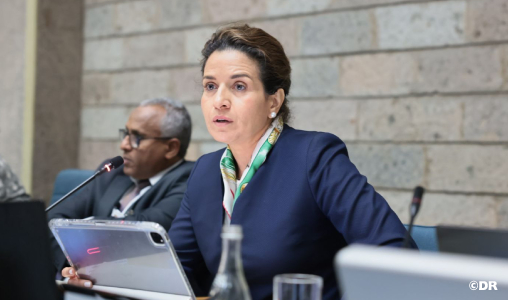On Wednesday, Leila Benali, Morocco’s Minister of Energy Transition and Sustainable Development, presented the Kingdom’s vision to address climate finance challenges in Africa during the 20th session of the African Ministerial Conference on the Environment (AMCEN-20), held in Nairobi.
Speaking during the opening ministerial session, Minister Benali emphasized that the climate finance challenges facing the African continent cannot be overcome without financial systems and budgetary frameworks that integrate the principle of sustainability. She noted that Morocco’s vision in this regard is built around three strategic pillars.
The first pillar concerns the institutionalization of climate finance within development strategies. She highlighted that Morocco launched a National Climate Finance Strategy — an ambitious roadmap aimed at mobilizing the financial resources required for a green and resilient economic transition.
Aligned with the country’s Sustainable Development and Low-Carbon Strategies, this national strategy aims to strengthen governance, enhance public spending efficiency, and encourage private financing in green and sustainable projects, she stated.
The second pillar, according to the Minister, focuses on strengthening governance and risk management. She underlined the need for coordinated action between governmental institutions and ministries responsible for environment and finance to ensure effective climate and budgetary planning.
In this context, she recalled the establishment of the National Commission on Climate Change and Biodiversity, including a working group dedicated to climate finance, to enhance coordination and monitoring of financial mechanisms. She also mentioned the Finance Ministry’s integration of climate change impacts in its annual debt sustainability assessments.
Minister Benali further advocated for the promotion of non-traditional financing models, including debt-for-climate swaps, green bonds, and carbon markets, stressing that Morocco — with its evolving financial ecosystem and experience in green financial instruments — could serve as a regional hub for sustainable finance, offering a gateway to Europe and Atlantic markets.
The third pillar she addressed was the need to revise the international financial architecture. She highlighted that the 2023 Annual Meetings of the IMF and World Bank, held in Marrakech, marked a turning point by emphasizing the need to rethink the global financial order to better serve countries of the Global South.
During this session, which included the participation of Kenyan President William Ruto, Minister Benali reaffirmed Morocco’s readiness to work alongside other African nations to build a resilient, prosperous, and sovereign Africa capable of shaping its own climate future.
In this spirit, she announced that Morocco is planning to launch an initiative to establish an African Task Force on Green and Sustainable Finance, which would serve as a catalyst for a coherent, inclusive, and operational African sustainable finance framework. The Task Force would also contribute to strengthening Africa’s sustainable finance architecture to help achieve the continent’s environmental and climate goals.
The 20th session of AMCEN, which began Wednesday at the headquarters of the UN Environment Programme (UNEP) in Nairobi, includes a Moroccan delegation led by Minister Benali.
Morocco’s participation in the conference — held under the theme “Four decades of environmental action in Africa: Reflecting on the past and imagining the future” — reflects its strong commitment to actively contributing to the development and implementation of ambitious African environmental policies. This aligns with the High Directives of His Majesty King Mohammed VI in favor of a sustainable future for Africa and future generations.
The conference will continue through July 18, offering a key moment to reflect on 40 years of regional environmental cooperation.



